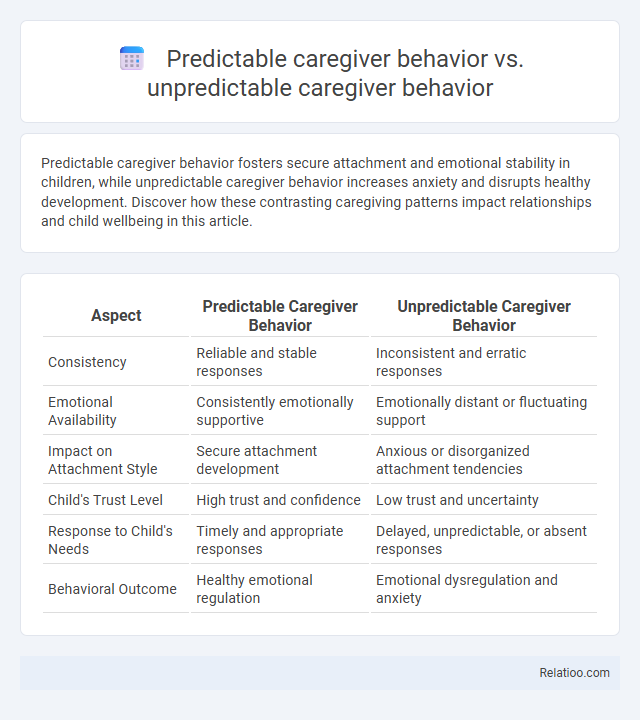Predictable caregiver behavior fosters secure attachment and emotional stability in children, while unpredictable caregiver behavior increases anxiety and disrupts healthy development. Discover how these contrasting caregiving patterns impact relationships and child wellbeing in this article.
Table of Comparison
| Aspect | Predictable Caregiver Behavior | Unpredictable Caregiver Behavior |
|---|---|---|
| Consistency | Reliable and stable responses | Inconsistent and erratic responses |
| Emotional Availability | Consistently emotionally supportive | Emotionally distant or fluctuating support |
| Impact on Attachment Style | Secure attachment development | Anxious or disorganized attachment tendencies |
| Child's Trust Level | High trust and confidence | Low trust and uncertainty |
| Response to Child's Needs | Timely and appropriate responses | Delayed, unpredictable, or absent responses |
| Behavioral Outcome | Healthy emotional regulation | Emotional dysregulation and anxiety |
Introduction to Caregiver Behavior Patterns
Predictable caregiver behavior fosters a secure attachment by providing consistent responses that help children feel safe and understood. Unpredictable caregiver behavior leads to confusion and anxiety, undermining trust and emotional stability in children. Caregiver consistency is crucial for healthy development, as it reinforces reliable communication and emotional regulation in the caregiver-child relationship.
Defining Predictable Caregiver Behavior
Predictable caregiver behavior involves consistent, reliable responses that foster a secure environment for your child, supporting healthy emotional development. This consistency contrasts with unpredictable caregiver behavior, which can create confusion and anxiety due to erratic or inconsistent reactions. Caregiver consistency ensures that your child understands what to expect, promoting trust, emotional stability, and effective bonding.
Characteristics of Unpredictable Caregiver Behavior
Unpredictable caregiver behavior is marked by erratic responses, inconsistent emotional availability, and sudden mood shifts that confuse and distress the child. Such behavior disrupts the child's sense of security, leading to anxiety, attachment issues, and difficulty trusting caregivers. Your understanding of these erratic patterns highlights the critical need for caregiver consistency to foster a stable and nurturing environment essential for healthy development.
Psychological Impact on Children
Predictable caregiver behavior supports secure attachment in children by fostering trust and emotional stability, which enhances their ability to regulate emotions and develop social skills. Unpredictable caregiver behavior can lead to anxiety, confusion, and difficulty forming healthy relationships due to inconsistent responses that undermine a child's sense of safety. Caregiver consistency is crucial for promoting psychological resilience, enabling children to build confidence and cope effectively with stress and adversity.
Emotional Development and Stability
Predictable caregiver behavior fosters secure attachment and emotional regulation in children, enhancing their overall emotional stability and confidence. Unpredictable caregiver behavior often leads to increased anxiety, insecurity, and difficulty in managing emotions, disrupting healthy emotional development. Consistent caregiving provides a stable environment that supports trust-building, emotional resilience, and positive social outcomes throughout childhood.
Attachment Styles and Bonding
Predictable caregiver behavior fosters secure attachment by providing a reliable emotional environment, enabling consistent bonding and trust development in children. Unpredictable caregiver behavior often leads to anxious or avoidant attachment styles due to inconsistent responses, causing confusion and emotional insecurity in the child. Caregiver consistency is critical for healthy bonding, as it supports the child's sense of safety and emotional regulation, ultimately shaping resilient attachment patterns.
Long-term Effects on Social Skills
Predictable caregiver behavior fosters secure attachment and enhances Your ability to develop strong social skills through consistent emotional support and reliable interactions. Unpredictable caregiver behavior often leads to anxiety and difficulty in forming trust, negatively impacting communication and peer relationships. Caregiver consistency promotes emotional regulation and social competence, providing a stable foundation for healthy social development over time.
Parental Consistency and Child Confidence
Parental consistency fosters child confidence by creating a stable environment where predictable caregiver behavior meets the child's emotional needs reliably. Unpredictable caregiver behavior, in contrast, can undermine trust and increase anxiety, impairing the child's ability to feel secure and develop resilience. Your consistent responses as a caregiver strengthen attachment bonds, promoting a foundation for healthy emotional and social development.
Strategies to Promote Predictability in Caregiving
Predictable caregiver behavior fosters security and trust by establishing consistent routines and clear communication, which help regulate Your loved one's emotional and cognitive responses. Strategies to promote predictability include maintaining regular schedules, setting clear expectations, and using consistent verbal and nonverbal cues, which reduce anxiety and behavioral challenges. Emphasizing caregiver consistency ensures that Your care is reliable and supportive, improving overall well-being and strengthening the caregiver-care recipient relationship.
Conclusion: The Importance of Consistent Care
Consistent caregiver behavior fosters secure attachments, promoting Your child's emotional stability and trust development. Unpredictable caregiver actions can lead to anxiety, insecurity, and difficulties in emotional regulation. Prioritizing caregiver consistency ensures healthier developmental outcomes and stronger parent-child bonds, underscoring its critical role in early childhood care.

Infographic: Predictable caregiver behavior vs Unpredictable caregiver behavior
 relatioo.com
relatioo.com